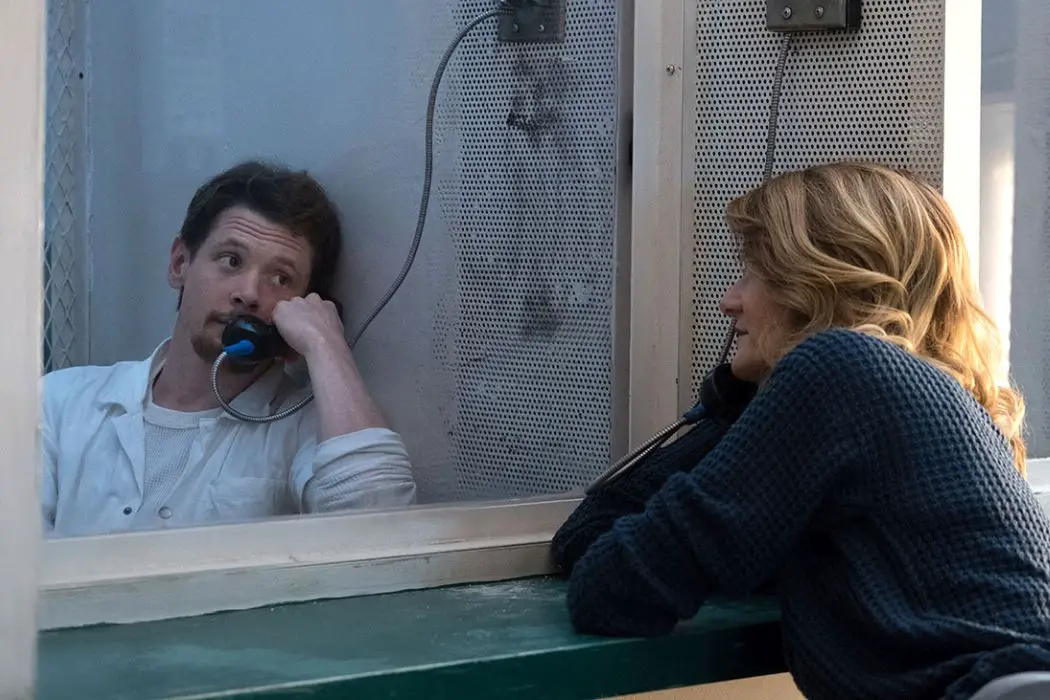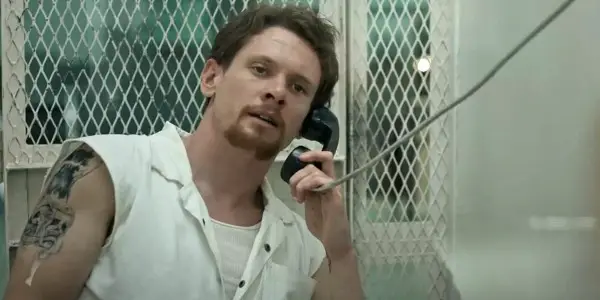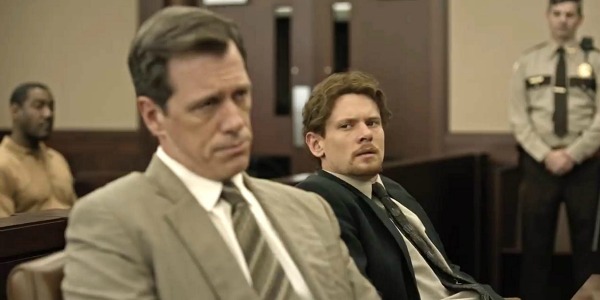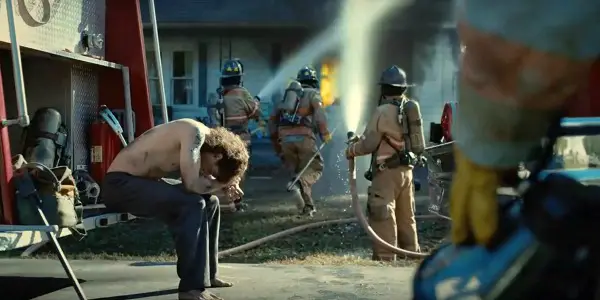San Francisco International Film Festival 2019 Review: TRIAL BY FIRE

Alex Arabian is a freelance film journalist and filmmaker. His…
Director, producer, and screenwriter Edward Zwick‘s breadth of work may not be as plentiful as many of his more recognizable industry peers, however, his filmography is distinctively compact, distinguished, and amply ambidextrous. Glory, Legends Of The Fall, Courage Under Fire, Shakespeare In Love, The Last Samurai, and Traffic are only a portion of the profusion of accomplished films from the veteran filmmaker in his terse but prestigious filmography. His latest effort at the helm, Trial By Fire, authored by screenwriter Geoffrey Fletchern (Precious) and adapted from David Grann‘s eponymous New Yorker article, explores a true story of corruption and deceit within the prison industrial complex, shedding light on the inhumanity of the death penalty.
Trial By Fire follows Cameron Todd Willingham (Jack O’Connell) from his wrongful conviction of burning his three children alive, to his determined fight against the clock to prove his innocence, his beautiful relationship with playwright Elizabeth Gilbert (Laura Dern), who fought by his side to dispute his case with The United States Court of Appeals for the Fifth Circuit, the overwhelming of evidence proving his innocence, former Texas governor Rick Perry’s (now the United States Secretary of Energy under the Cabinet of Donal Trump) repugnantly perfidious dismissal of the aforementioned evidence to serve his backwards political agenda, and Willingham’s execution. The film is an engaging but sobering look at the difficult truths of an archaic U.S. criminal justice system.
With an empathetic directorial approach (Zwick underwent a similar experience during which he witnessed a wrongful execution at a young age), scorching performances by the cast, particularly O’Connell, a thoughtful script by Fletchern, and an effectively convincing argument contributing to the topical discourse of the morality of the death penalty in the U.S., Trial by Fire is a continuation of Zwick’s outstanding career.
O’Connell’s Tenacity & Willingness To Embrace Darkness
Zwick has only seen O’Connell act in the British television show Skins and ‘71 on the silver screen before casting him in Trial By Fire. However, he managed to see him perform onstage, up close and personal, which had a profound effect on the filmmaker. This sealed the deal for Zwick’s casting of Willingham.
“I had not seen Starred Up until we were working together.” Zwick told me in an interview with The Playlist. “I went to England and he was doing a play. He was doing Cat on a Hot Tin Roof with Sienna Miller there. His willingness, his bravery to go into any kind of situation and reveal darker and less-attractive aspects of a character rather than trying to insist on something that was obviously heroic or somehow prettified wasn’t interesting to him, and obviously not interesting to me, either.”

It’s O’Connell’s performance in Starred Up that draws the most parallels between the characters he plays. However, rather than portraying a ruthless, violent criminal, as he does in Starred Up, O’Connell’s turn as Willingham brings a considerable more amount of empathy to the story, albeit, both characters equally powerful, onscreen forces to be reckoned with. O’Connell completely disappears into his roles, never shying away from displaying the less flattering sides of human nature, as Zwick so eloquently observed.
Perhaps most impressive about O’Connell’s performance is his dialectical transformation from his natural Darby accent to the specific manner of speaking of natives of Willingham’s hometown, Corsicana, Texas. O’Connell worked tirelessly with a world-renowned dialect coach and Juilliard graduate, Tim Monich (name a famous actor, and he’s likely coached them). Monich worked with Zwick on Blood Diamond to perfect Leonardo DiCaprio’s Rhodesian (now Zimbabwe) accent. Much like DiCaprio, O’Connell spoke the dialect off set, even at home, perfecting it so that he would be able to improvise within the scenes with ease.
A Seamless Hybridization Of Genres
Trial By Fire is part courtroom drama, part prison drama, and part touching dual character study of a layered, mutually beneficial friendship, that also acts as a call for a much-needed change to the U.S. criminal justice system. Yet, somehow, the film flows together surprisingly smoothly. How, exactly, did Zwick pull off such a challenging feat? According to the director, it all starts at the script level during pre-production. Dern’s character isn’t introduced to the story until, roughly, halfway through the film’s 127-minute runtime. And somehow, it seems entirely appropriate for Gilbert and Willingham’s relationship.

“If you feel that you’re trying to, in some way, separate [the genres], it’s often a problem.” Zwick said to me. “But in this case, it was a very unusual structure, which is to say to withhold Laura‘s introduction as someone would have experienced the case. It would have been very easy to have had her in her home listening to the trial or going to the courtroom. I could have integrated her into it, but it wouldn’t have been the true experience of somebody coming from the outside. She would’ve had preconceptions.
“And similarly, [Jack’s] initial incarceration, and solitary, and all of this was a way of putting him in this place as an actor and as the man must have been, and Laura in this place of when they come together – I literally kept them apart. They had not worked together until those scenes. I wanted those scenes to contain the discovery and the surprise that it would have had of meeting the other person, and shoot them in some way that were in continuity.”
At a time when certain viewers may think Trial By Fire loses steam, it gains new life when Gilbert and Willingham’s relationship is introduced within the film, and a new genre takes form. This relationship takes the place of Willingham and his wife, Stacy (who couldn’t bare to endure the pain of his incarceration anymore), portrayed by Emily Meade of The Deuce fame. Gilbert and Willingham’s friendship and fight against time to prove his innocence, interweaves with tasteful magical realism, is a riveting, endearing, and ultimately heartbreaking aspect of this true story.
Every Character Gets Their Rightful Due
It can be exorbitantly easy to place little heed into minor characters within a script, particularly with historically unlikable archetypes that are historically dehumanized and portrayed as one-note. Characters that are minor antagonists. Mere plot devices to motivate the protagonist or antihero. Case in point: the prison guard archetype. The Shawshank Redemption, The Stanford Prison Experiment, Escape From Alcatraz, Papillon (based on the eponymous 1969 autobiography by the French convict Henri Charrière, which Willingham reads throughout Trial By Fire in an attempt to maintain his hope and sanity), Cool Hand Luke, and Bronson are but a select handful of films that exemplify the one-note prison guard archetype.

In Trial By Fire, Daniels (Chris Coy, also of The Deuce fame), undergoes a satisfyingly complete, human, and, ultimately, humanistic character arc. Daniels’ substantial transformation from ruthless, seemingly malign bully to empathetic bystander, friend of Willingham, and someone who ends up detesting the nature of his job as an executioner guard after realizing Willingham’s innocence. The character is a composite of the many prison guards Zwick met and talked to during his research for the film. It was important for him to show that these people have a profound struggle of their own. A lot of prison guards spend their life in jail as well. And that notions was key for Zwick in telling Daniels’ story as well as portraying the far-reaching ill-effects the death penalty.
“I spoke on the phone to two guards who had been executing guards.” Zwick explained. “It’s a revolving system, often, where it’s not always the same guy who has to end up having to push that button. Sometimes two push it at the same time not to know who’s actually the one accountable. But nonetheless, there was a man from Arkansas who finally could not do it, and he has become a militant activist against the death penalty having had that experience. And that was on my mind.”
Conclusion: Trial By Fire Can Potentially Change Hearts & Minds
Just as the aftermath of Willingham’s trial and execution and Grann‘s subsequent New Yorker article caused significant progress in the arson junk science movement, with some convictions even being thrown out due to the new science, Trial By Fire has the similar potential to make an impact on the current societal debate over the morality of the death penalty.
“It is a moment where there’s a new trope in the culture.” Zwick said. “It used to be crime and punishment. And crime and innocence is rising. If you think about the Serial podcast, “Making a Murderer“, and some of the other documentaries, there are [also] several different podcasts about this system. Because there is an unpunished predator [Donald Trump] at the top of the system at this moment, there is an awareness of injustice, and that can’t help but be something that this might plug into. At least I would hope so.”
California Governor Gavin Newsom‘s recent moratorium on the death penalty in California, sparing the lives of 737 people on death “may be the crest of a wave,” Zwick hopes, however, progress isn’t always linear, as history has repeatedly hammered into our collective psyches. One can only hope that criminal justice reform happens more rapidly as the current administration continues to dissolve and implode upon itself and more progressive leaders begin to lead the U.S. in the near future.
Trial By Fire is an expertly-crafted work of art that doubles as a biopic and perceptive, dual character study, brimming with jaw-dropping performances led by the versatile O’Connell. It’s characterized by a distinct synergy between the cast and crew that bleeds onto the screen, exemplifying Zwick’s signature, collaborative approach to filmmaking.
Did Willingham’s story move you? Where do you stand on the issue of the death penalty in the U.S. and beyond?
Trial By Fire is set to be released on May 17, 2019. For more information about its release, click here.
Does content like this matter to you?
Become a Member and support film journalism. Unlock access to all of Film Inquiry`s great articles. Join a community of like-minded readers who are passionate about cinema - get access to our private members Network, give back to independent filmmakers, and more.
Alex Arabian is a freelance film journalist and filmmaker. His work has been featured in the San Francisco Examiner, The Playlist, Awards Circuit, and Pop Matters. His favorite film is Edward Scissorhands. Check out more of his work on makingacinephile.com!













